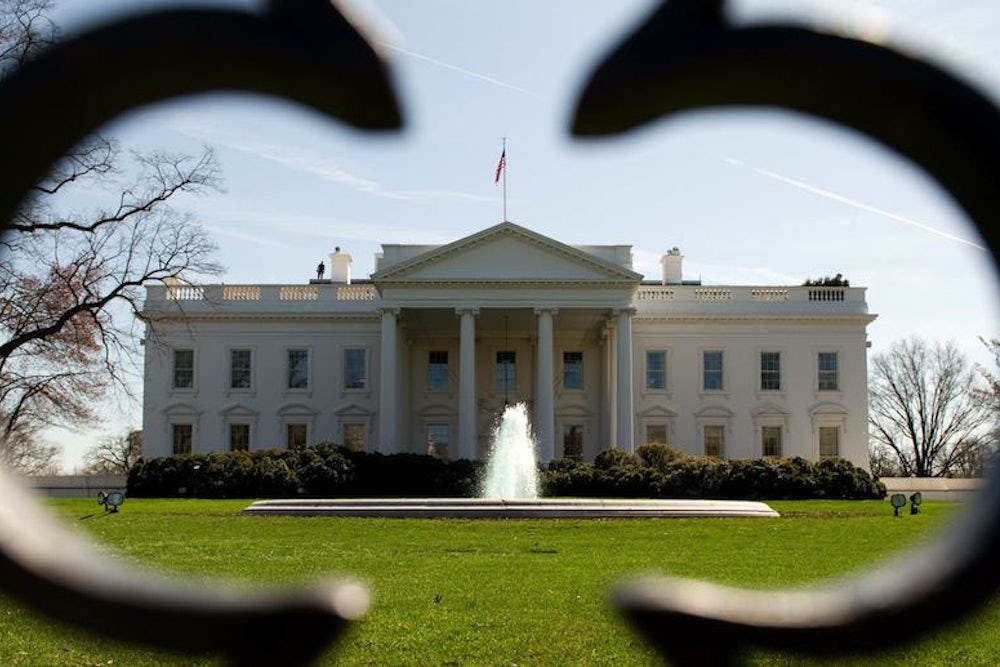America has an uneasy relationship with the idea of the unpaid internship. On the one hand, it’s a way for young people to get some experience and learn some things. On the other, it’s a form of resume-building that’s rigged in favor of kids who can afford it—and especially of kids whose connections can get them hired.
It seems that this awkwardness goes all the way to the top. At the White House, interns work throughout the Executive Office of the President. Some read letters and staff events, while others help with research or write memos. Applications are available to anyone on the White House’s website, and at first blush, it seems like a wonderfully democratic opportunity. “The White House Internship Program’s mission is to make the ‘People’s House’ accessible to future leaders from around the nation,” the site announces.
Alas, the actual roster of the outgoing class is not quite as egalitarian as the online hype, or president’s general political rhetoric, would suggest.
The list of interns who toiled in the executive mansion during the summer of 2013 included the offspring of Ron Klain, the former Joe Biden former chief of staff; Steve Rattner, the financier and onetime car czar; Don Baer, the communications powerhouse and former Clinton administration speechwriter; and Margaret Hamburg, the Food and Drug Administration commissioner. There’s also a young man named Summers, whose father will not be chairing the Federal Reserve—though it’s safe to say his family had a certain familiarity with the White House and other corridors of power before he landed that internship.
The proud parents of the class of 2013 also included Raghuveer Nayak, a Chicago democratic donor and fundraiser for former Illinois pols Jesse Jackson Jr. and Rod Blagojevich (he also donated $19,800 to Obama between 2004 and 2009). There was also a scion of the Lerner family, the real estate titans who own the Washington Nationals, and children of at least two different VIPs among influential Washington law firms: Winston & Strawn’s Timothy Broas and Holland & Knight’s Rich Gold.
All in all, 44 of this year’s 147 interns attended Ivy League schools. That’s precisely the same number as attended all of the country’s state schools. Some 18 of those 44 Ivy-credentialed had, like the president, studied at Harvard. And a full 7 of this year’s interns went to the same high school: D.C.’s pricy Georgetown Day School, which produced more interns than the states of Florida, Pennsylvania, or Illinois.
Comic hypocrisy alert: The reason I know about that particular cabal is that I went there too. And, before my time, so did two of my editors.
Which brings us to the essential awkwardness of internships. None of the interns did anything wrong in accepting the internship, and there’s nothing to suggest any of them were unqualified. And parents everywhere advocate for their kids. Still, the class hardly seems to represent a cross section of the nation.
The White House declined to comment on its intern selection process. So I called the current expert on Beltway logrolling, who seemed unsurprised. “I’m guessing that a lot of these jobs started with a higher level phone call,” said Mark Leibovich, the author of This Town.
“It’s obviously a very, very small town,” Leibovich said. “This is all sort of a piece of the political-media class all swimming in the same fishbowl of elite schools and privileged environments.” So it’s not surprising, he said, that “the Obama administration has become a full employment service” for the next generation of that elite insider class.
It’s not just the White House that works this way. Unpaid internships have come increasingly under fire since Fox Searchlight Pictures interns Eric Glatt and Alexander Footman sued the company in 2011 and won the suit this summer. Federal District Court judge William H. Pauley III ruled in favor of the interns and called for companies to adhere to Department of Labor requirements for unpaid interns. Under those guidelines, an internship must be for the benefit and education of the intern, and the intern must not be helping the employer’s work. But those rules don’t apply to the government. According to Ross Perlin, the author of Intern Nation, Congress and the White House rely heavily on unpaid labor.
A recently launched operation called the Fair Pay Campaign aims to bring attention to the White House’s failure to pay its interns. Mikey Franklin, the campaign’s founder, said the White House is just the first target in his crusade against the rise of the unpaid internship. “It’s an obvious place to start,” he said, because the White House should be a model for the rest of the country. “It’s a particularly egregious case.”
“Internships turn even more on nepotism and personal connections than regular jobs do,” said Perlin. “To my knowledge, not a single politician at the national level has stepped up and even said ‘I’m going to pay all my interns.’ No one has stepped up and made this an issue. They take [interns] for granted….It’s something they want to use as a way to do favors for people.”
It’s not exactly clear, however, that paying political interns would change this dynamic. Beyond remuneration, there are obstacles of access: Members of the elite class are more likely to know about and apply to fancy internships.
And if the pay changed but the employees did not, the whole process might be even more unseemly. “I think it’s easier for [the White House not to pay its interns] optically,” Leibovich said. “If they were paid, [this] would be more damning.” Onlookers would be up in arms about the White House exacerbating social stratification, and paying the beneficiaries along the way.
As things are, the only benefit is an internship for which self-made kids are celebrated as heroes in hometown newspapers across the country. But for some of the interns, the gig is par for the course; when you can afford to go without pay, it’s just another notch on the resume.
